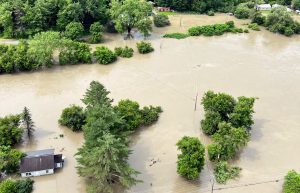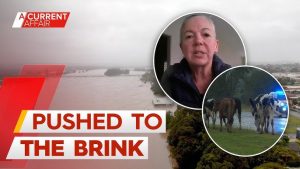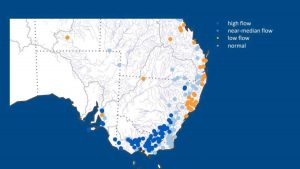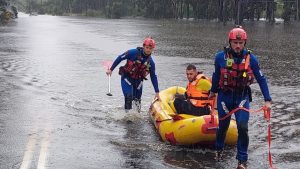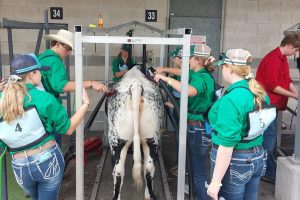
Rochester farmer Tom Acocks said he started moving cows on Friday afternoon as floodwater began to destroy fodder and block off roads.
“The cows in the milking barn are fine, they’re high and dry,” he said.
He said he was preparing for flooding worse than he experienced in 2011.
“We won’t be the only farmers in the region that are tipping milk — we’re in the lap of the gods,” he said.
Milk Exchange general manager of commercial development, Richard Lang, said about 20 per cent of Victoria’s milk was produced in regions affected by floods.
“There’s about 1 million litres a day which needs to be collected in the flooded areas,” he said.
He said there were 900 farmers and about 30 factories in northern Victoria.
“These all need open roads and an ability to have power to milk the cows,” he said.
“If trucks don’t get through [to the farms] the milk gets tipped, and that obviously has an impact on incomes.”

Food shortages
Federal Emergency Management and Agriculture Minister Murray Watt said extensive flooding across Victoria, New South Wales and Tasmania could cause food shortages.
“I certainly think there’s going to be a big impact on food production and prices as a result of this,” Mr Watt said.
He and Prime Minister Anthony Albanese toured flooded areas this week — including Bendigo and further north at Dubbo and Gunnedah in New South Wales.
“Crops that were getting ready for harvest are now destroyed,” Mr Watt said.
“That will hit farmers, and it’ll also hit consumers when they go to buy their fruit and vegetables and other agricultural products.”

Farmer Stuart Giles has been using his drone to track flooding through Charlton.(Supplied: Stuart Giles)
He said up to 90,000 people had been affected by flooding in Victoria.
“This is a combination of people with floodwaters in their home and who would be isolated,” Mr Watt said.
He said that included about 9,000 Victorian homes inundated and a total of 34,000 houses in the state affected by the flooding or cut off by floodwater.
“It shows how widespread this disaster is right across northern Victoria,” Mr Watt said.
He said 100 Australian Defence Force personal were helping flooded communities and army helicopters had been deployed.

Emerging threat
Bega Foods Tatura processing plant has lost electricity and the company is trying to access generators to power the factory and get about 2 million litres of milk processed before it goes off.
Bega Foods nutritionals business manager Hamish Reid said road access had been cut to farms.
“Many of our suppliers are also without power so we are getting together with local electricians and moving generators around so the cows can be milked,” he said.
“The milk that is able to be collected at the moment is going into other processors who are supporting us at this time.
“There will be milk dumped on farm unfortunately which is a real tragedy when it’s in such scarce supply.”

Mr Reid said storing milk on farm or in the factory for more than three days could result in the product not being fit for sale.
“If there is any milk that is lost on farm we cover those costs with our suppliers — we ensure they are as protected as possible from any financial impacts of this,” he said.
Mr Lang said attempts to get milk tankers into areas such as Echuca had so far been successful but rising floodwater would likely prevent milk being collected in coming days.
“What we’ve found from a supply chain point of view, people have done a lot of preparation in these areas and know that the threat is emerging,” he said.
“We need to improve and maintain really strong communication on road management.”
Mr Lang said animal welfare would become a concern if the cattle weren’t regularly milked as the likelihood of illnesses such as mastitis, an inflammation of the mammary gland which could become infected, increased.








